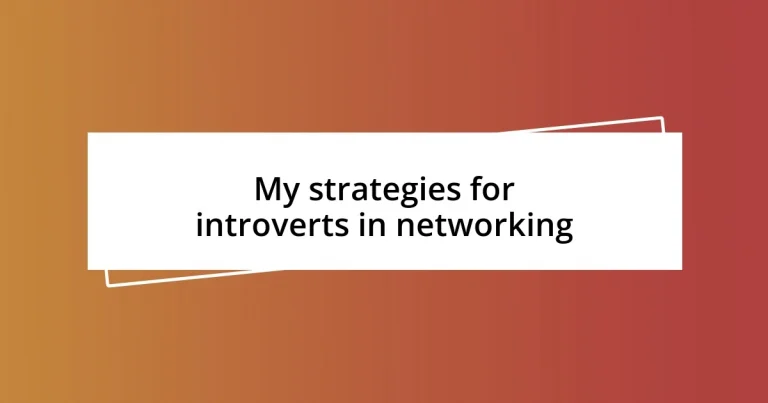Key takeaways:
- Introverts can thrive in networking situations by embracing their unique communication styles and focusing on meaningful, one-on-one interactions rather than large group settings.
- Preparation strategies, such as researching attendees, setting achievable goals, and practicing conversation starters, can significantly boost confidence and reduce anxiety before networking events.
- Building and nurturing connections through active listening and personalized follow-ups can transform brief encounters into valuable long-lasting relationships.
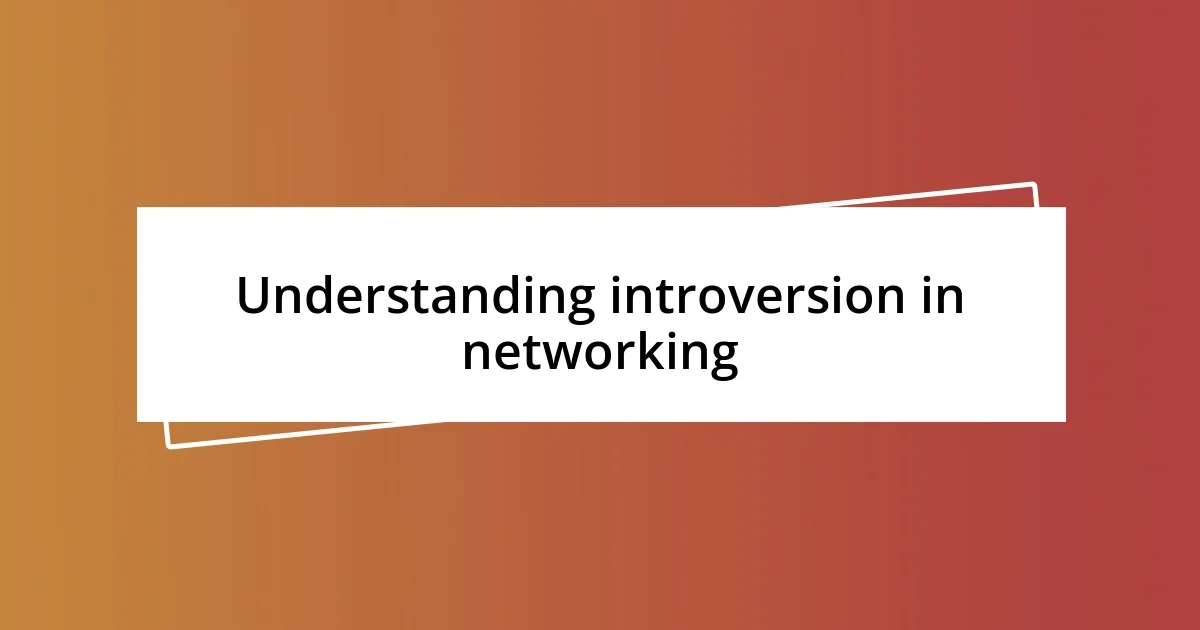
Understanding introversion in networking
Understanding introversion in networking often requires a shift in perspective. It’s easy to assume that networking is all about small talk and big crowds, but for introverts, it can feel overwhelming. I remember my first major networking event; I was surrounded by chatter and laughter, and I felt like a fish out of water. The noise was almost suffocating, and I constantly questioned if I belonged there.
Introverts tend to recharge in solitude and may need time to process conversations. I’ve learned that after an event, I often need a quiet space to reflect on what I’ve heard. Does that resonate with you? It’s perfectly normal for introverts to prefer deeper, one-on-one interactions over group settings. I’ve found these quieter connections often lead to the most meaningful relationships.
The fear of being misunderstood is a common thread among introverts in networking situations. I vividly recall a time when I struggled to share my thoughts in a lively discussion, fearing my insights might not land well. It made me realize that embracing our unique communication style is essential. So, how can we navigate this landscape? Understanding that our perspective adds value—and learning to leverage that strength—can help introverts thrive in networking scenarios.
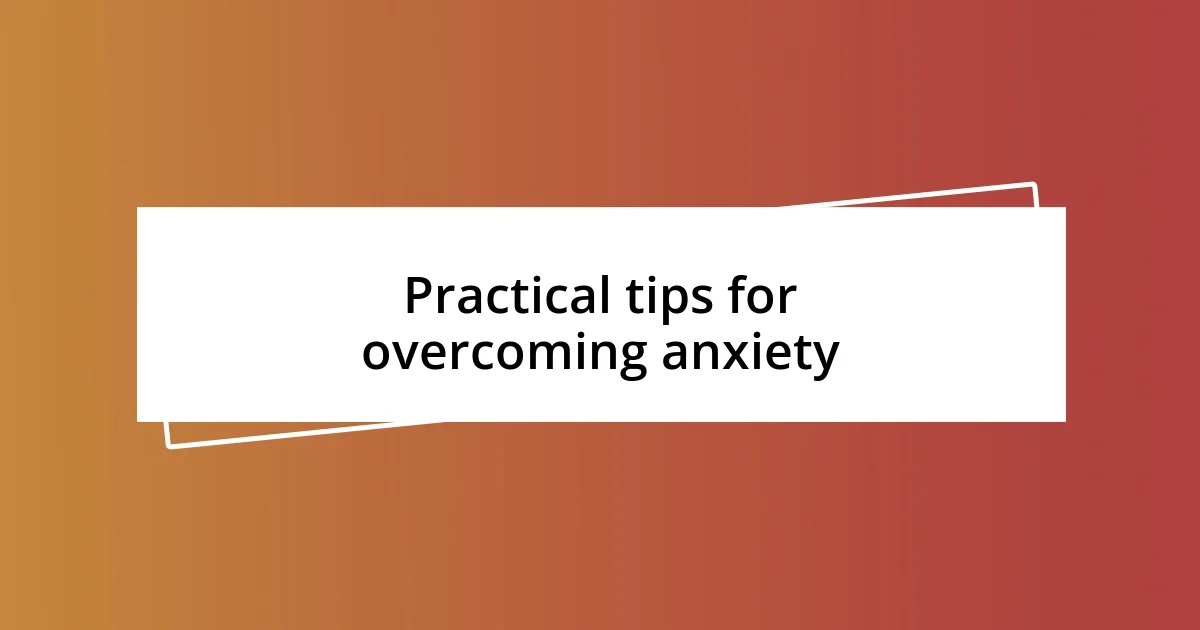
Practical tips for overcoming anxiety
When it comes to overcoming networking anxiety, I’ve discovered a few practical approaches that truly make a difference. One strategy is preparation. Before attending an event, I often jot down a couple of engaging topics or questions I can ask others. Having these mental cues helps ease the initial awkwardness of starting a conversation. I remember one event where I felt especially nervous, so I practiced some openers in the mirror beforehand. It made all the difference, turning my anxiety into excitement!
Another helpful tip is to focus on listening. Instead of worrying about what I should say next, I remind myself that asking questions and showing genuine interest can shift the spotlight away from me. This approach not only helps alleviate anxiety but also allows for a more natural flow in conversation. I once had a deeply meaningful exchange when I simply asked someone about their passion project. It turned into a delightful discussion, and I left feeling energized rather than depleted.
Lastly, timing is essential. Allow yourself to take breaks. I learned this the hard way during a conference where I pushed myself to stay in high-energy environments for too long. It left me drained and anxious, struggling to engage. Now, I make it a point to step outside or find a quiet corner every hour or so. I come back refreshed and ready to connect, ultimately enhancing my networking experience.
| Tip | Explanation |
|---|---|
| Preparation | Write down topics/questions to ease into conversations. |
| Active Listening | Focus on listening to others to reduce pressure on yourself. |
| Take Breaks | Step away from the crowd to recharge your energy. |
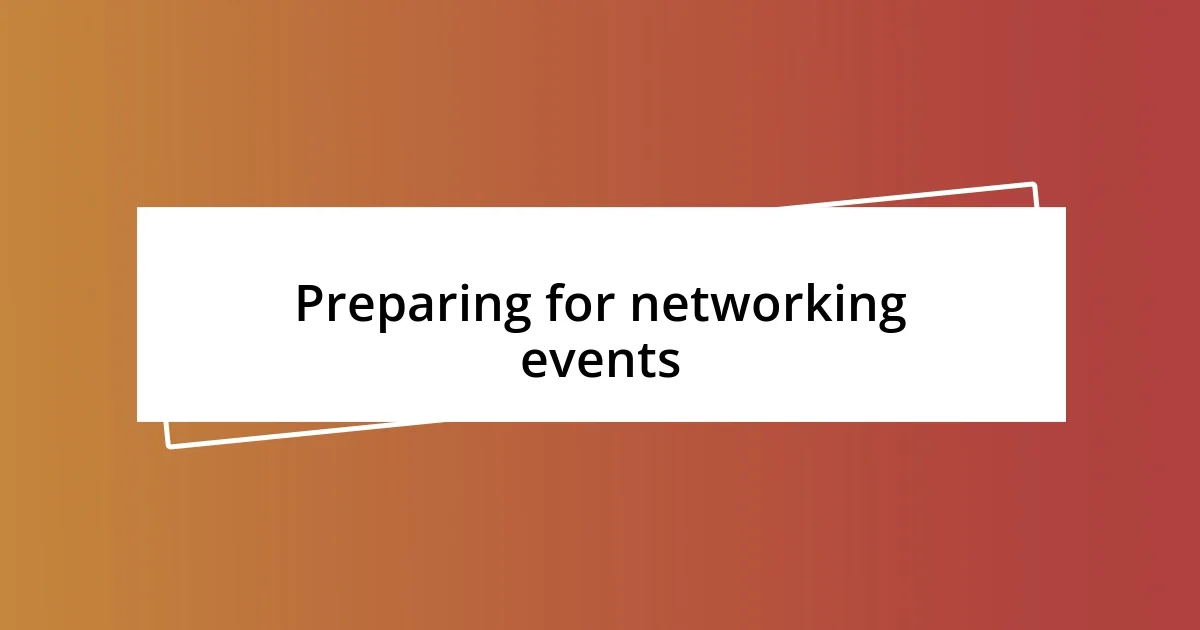
Preparing for networking events
Preparing for networking events starts with a solid game plan. When I prepare, I create a mental checklist that helps ground me. I remember one event where I felt completely overwhelmed because I didn’t have my strategies in place. Since then, I’ve discovered that with a little preparation, I can walk in feeling more confident and less anxious.
Here’s what I focus on before an event:
- Research the Attendees: I often look into the profiles of people I might meet. Knowing who’s attending helps me feel more connected and gives me conversation starters.
- Set Goals: I like to set small, achievable goals—like meeting three new people. It’s less daunting and gives me a sense of accomplishment by the end of the event.
- Dress Comfortably: I choose my outfit carefully, ensuring it reflects my personality while being comfortable. Feeling good in what I wear boosts my confidence.
- Visualize Success: Before stepping into the venue, I take a moment to visualize a positive interaction. Imagining that success creates a sense of ease that carries me through the event.
By honing in on these prep strategies, I’m able to shift my focus from anxiety to excitement as I approach networking opportunities. Each preparation step is like laying down a stepping stone toward more meaningful connections.
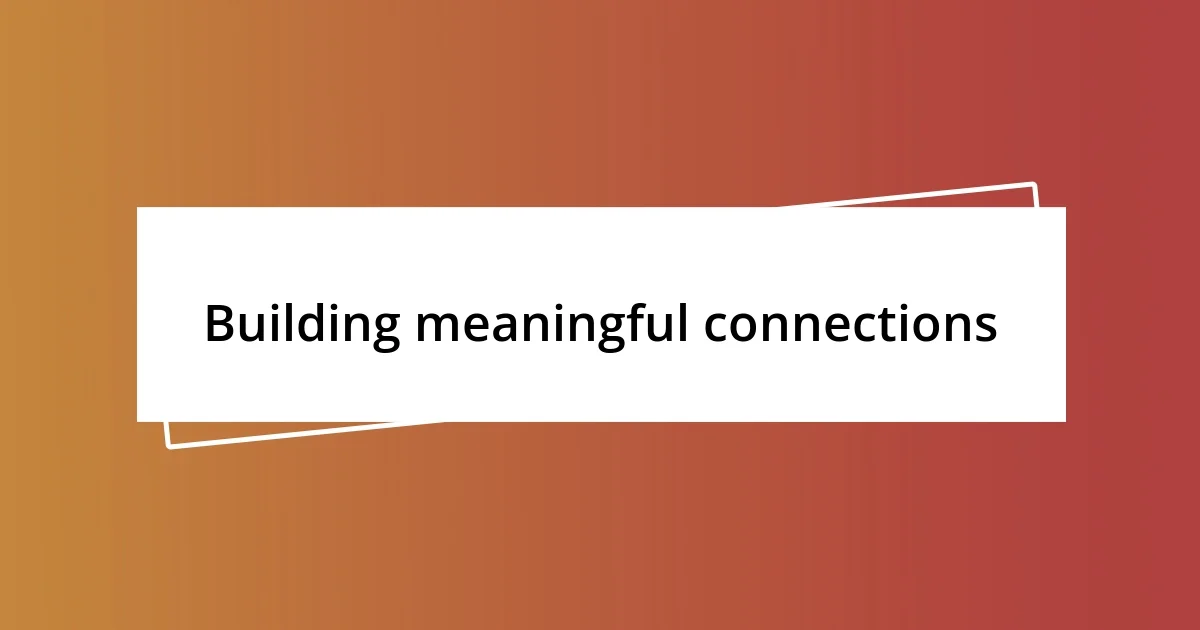
Building meaningful connections
Building meaningful connections goes beyond mere small talk; it’s about finding common ground and establishing rapport. I vividly recall a particular event where I struck up a conversation about a shared interest in music with someone I had just met. It felt effortless because we both lit up discussing our favorite artists. When connections are rooted in shared passions, the conversation deepens, and there’s less pressure to fill the silence.
Listening intently enhances our ability to forge these connections. Have you ever been on the receiving end of a truly engaging conversation? Those moments resonate because the other person was genuinely interested in what I had to say. During one networking event, I met someone who captivated me with their stories about their travels. By actively listening and asking follow-up questions, I was able to build a meaningful dialogue that lingered in my thoughts long after we parted ways.
Creating memorable moments often involves vulnerability. It can feel uncomfortable to share a personal story, but doing so can foster deeper connections. I remember sharing my journey of transitioning careers with a fellow introvert. That moment of honesty opened up a safe space for both of us to share our experiences and aspirations. It’s these genuine exchanges that transform fleeting encounters into lasting relationships. In the end, building meaningful connections is less about the number of people we meet and more about the quality of those interactions.
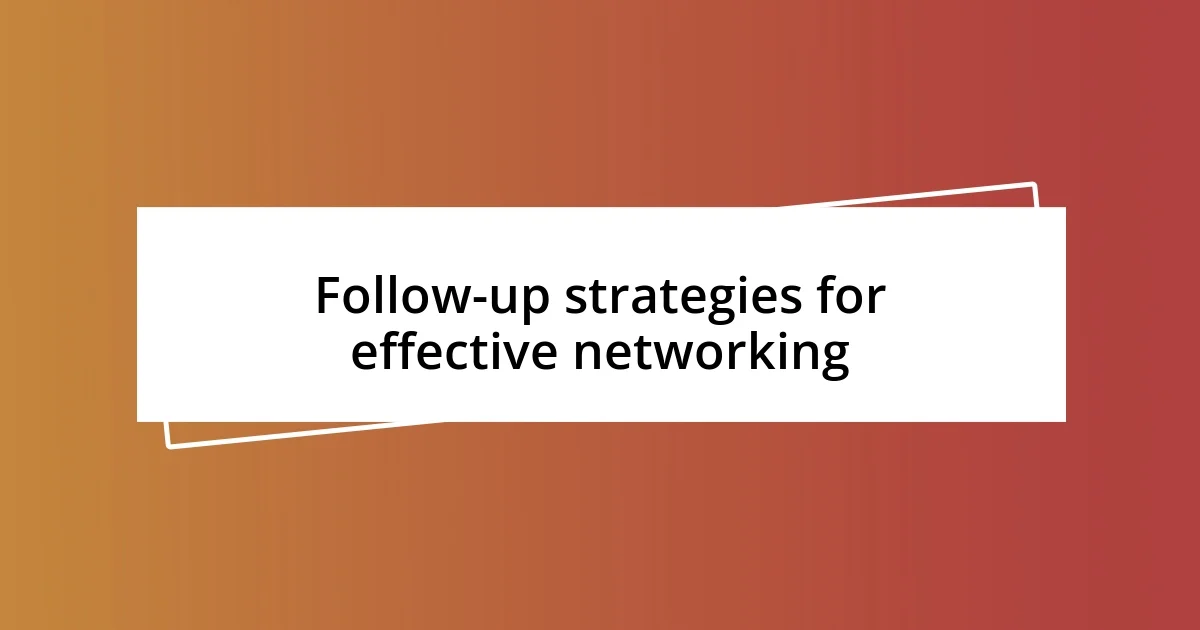
Follow-up strategies for effective networking
After a networking event, I believe the follow-up is just as crucial as the initial interaction. For me, sending a personalized email or message within 24 hours feels like a natural extension of our conversation. I remember following up with someone I met at a workshop who shared insights about project management. I referenced our discussion and added a related article I found, which not only kept the dialogue going but also showed that I valued their input.
It’s interesting how a simple follow-up can open doors. Sometimes, I ponder whether others see the value in this step as much as I do. I was pleasantly surprised when a casual follow-up led to a coffee chat rather than just a digital exchange. This meeting transformed into a mentorship opportunity, and that moment reinforced for me the importance of nurturing connections beyond the initial encounter.
Another approach I’ve found effective is connecting on social media platforms. I’ve often sent connection requests to people I met, along with a brief note reminding them of our interaction. Recently, I reached out to someone on LinkedIn after a conference. We had discussed our aspirations in the industry, and this connection eventually blossomed into collaborative opportunities. The effort to reach out can turn brief encounters into valuable long-term relationships. How about you—have you ever felt the shift in a connection just because you took that follow-up step?
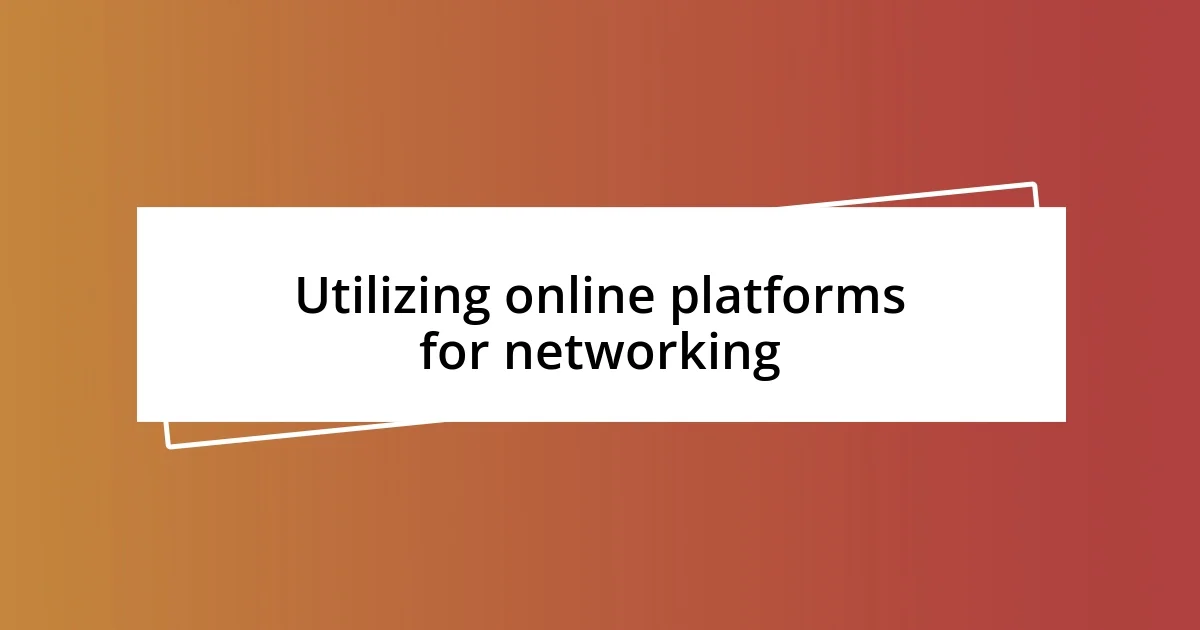
Utilizing online platforms for networking
Utilizing online platforms for networking has become second nature for many introverts like me. I remember the first time I used LinkedIn to reach out to a fellow attendee after a webinar. At first, I was anxious about how my message would be received, but the response was so welcoming that it encouraged me to send more connection requests. That single instance taught me how simply leveraging online tools can create opportunities for meaningful exchanges.
On platforms like Twitter, I discovered the power of engaging in discussions around shared interests. I recall a time when I joined a Twitter chat about sustainability. As I participated, I found both support and inspiration from others in the community. The experience was refreshing—seeing how my contributions sparked engaging conversations made me realize that I could carve out my own space in these digital realms.
Additionally, I’ve found Facebook groups to be fantastic for connecting with like-minded individuals. I joined a group focused on personal development and was surprised by how quickly I felt connected to others through shared experiences. Engaging in discussions there not only helped me gain insights but also led to forming authentic relationships. Have you ever stumbled upon a virtual community that connected with you in a similar way? It’s a reminder that even from the comfort of our homes, we can build genuine networks while embracing our introverted nature.












